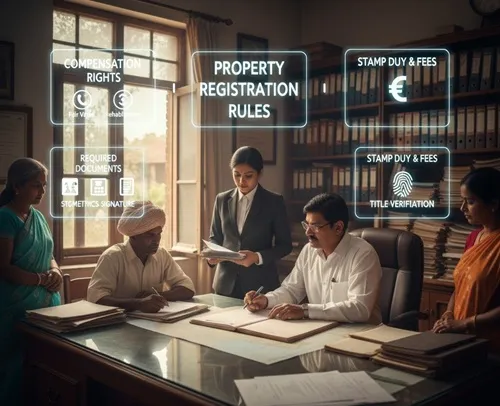Property Registration Rules & Required Documents.

The Registration Act, 1908 governs how property and legal documents are registered in India. Registration creates a public record, prevents fraud, and protects ownership rights. If you're buying, selling, gifting, or leasing property — registration is not optional; it's mandatory.
Key Highlights
- Mandatory registration for sale, gift, mortgage, or lease of immovable property (worth over ₹100).
- Optional registration for wills, adoption deeds, and agreements not involving immediate transfer.
- Documents must be registered within 4 months of execution (signing).
- Registration happens at the Sub-Registrar's Office where the property is situated.
- Ensures transparency, avoids double sale or fake ownership, and gives your transaction legal backing in court.
Documents Required for Property Registration
| Purpose | Documents Needed |
|---|---|
| Identity Proof (Buyer & Seller) | Aadhaar Card, Passport, Voter ID, or PAN Card |
| Address Proof (Both Parties) | Electricity Bill, Ration Card, or Driving Licence |
| Ownership Proof | Original Title Deed, previous sale deeds |
| Sale Consideration Proof | Bank receipt, cheque details, or payment acknowledgment |
| Property Documents | Encumbrance Certificate, Property Tax Receipt, Approved Building Plan |
| Photographs | Passport-size photos of buyer, seller, and witnesses |
| Power of Attorney (if applicable) | Registered PoA document |
| Stamp Duty & Registration Fee Receipt | Proof of payment before registration |
| PAN Card | Compulsory if transaction exceeds ₹10 lakh |
| No Objection Certificate (NOC) | From housing society or competent authority, if required |
Important Rules You Must Know
- Registration Timeline: Must be completed within 4 months of signing. Delay allowed for another 4 months with a penalty.
- Place of Registration: Only at the Sub-Registrar Office where the property is located.
- Presence Required: Buyer, seller, and two witnesses must be physically present (or represented via registered PoA).
- Language Rule: The Deed must be in a language understood by the registering officer — else a translated copy is required.
- Stamp Duty: Pay before registration. Rate varies by state (see table below).
- Digital Steps: Many states now allow e-appointment, online stamp duty payment, and digital deed verification.
- Unregistered Document: Has no legal effect in court for ownership claims.
- Rectification: Minor mistakes (like name spellings) can be corrected by a Rectification Deed.
Stamp Duty and Registration Fees (State-Wise Examples)
| State | Stamp Duty | Registration Fee | Online Link |
|---|---|---|---|
| Delhi | 6% (men), 4% (women) | 1% of property value | revenue.delhi.gov.in |
| Maharashtra | 5% + 1% metro cess (in Mumbai) | 1% | igrmaharashtra.gov.in |
| Uttar Pradesh | 7% | 1% | igrsup.gov.in |
| Tamil Nadu | 7% | 1% | tnreginet.gov.in |
| Karnataka | 5% | 1% | karnataka.gov.in |
| Telangana | 4% | 0.5–1% | telangana.gov.in |
(Rates vary based on gender, property type, and urban/rural location.)
Registration Act – FAQs
-
1. What is the Registration Act, 1908?
-
A law that governs how property and legal documents are officially recorded to establish ownership and prevent fraud.
-
2. Which documents must be registered?
-
Sale deed, gift deed, mortgage deed, lease over 12 months, and property transfer agreements.
-
3. What happens if I don't register?
-
The document won't be accepted in court and won't transfer legal ownership.
-
4. Can I register online?
-
Yes — states like Delhi, Maharashtra, Tamil Nadu, and Karnataka offer online services for appointment and fee payment.
-
5. Can someone register on my behalf?
-
Yes, through a properly executed and registered Power of Attorney.
-
6. How do I verify if my property is registered?
-
Check online through your state's registration portal or visit the local Sub-Registrar Office.
-
7. Can registration be cancelled?
-
Only through a court order or mutual consent if fraud or mistake is proven.
-
8. Is Aadhaar mandatory?
-
Not legally mandatory, but accepted widely as valid ID proof.
Add new comment